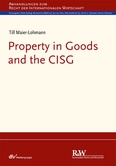As far as a unitary notion of property (in contrast to a functional notion under Nordic laws described above)143 is used, there are additional differences in when and how property is transferred under national law. The following provides a broad overview of the general diverging approaches on this topic. Two dividing lines along the necessity of a handing over and the relevance of the sales contract can be drawn.144 This section offers a bird’s-eye view rather than a comprehensive and detailed comparative account of the rules on the transfer of property, and lays the minimum groundwork for the following chapters.
1. Transfer of property due to mere consent or additional requirement of handing over of the goods
58
The first dichotomy between national laws on the transfer of property is between legal systems that consider the property to be transferred merely 27 due to the sales contract (solo consensu) and others that additionally require handing over of the goods (traditio).
59
French law exemplifies a large group of legal systems following the solo consensu approach: Article 1583 of the French Civil Code states that the property is acquired by the buyer with the conclusion of the sales contract without regard to whether the goods have been delivered or the price has been paid.145 This general principle can also be found in Belgium146 and Italy147 without surprising anyone, but is followed in many other parts of the world, too: In Middle Eastern and Arabic countries such as, for example, Egypt;148 in Asian and Eastern European countries;149 and in some Middle and South American countries.150 In addition, countries following the approach of the English Sale of Goods Act provide for the transfer of property by mere consent in the sales contract and provide rules for ascertaining the parties’ intention with regard to the transfer of property. These countries include England, Ireland, Wales, Scotland, Kenya, Tanzania, parts of Australia, parts of Canada and Hong Kong.151
60
Under these laws, however, it is not always the case that property passes with the conclusion of the sales contract. Indeed, there are many exceptions to the general rule, most notably that property in unascertained goods can generally not be transferred without ascertaining the respective goods 28 first.152 Property in future goods can be transferred only after the goods come into existence.153
61
In contrast to the solo consensu approach, the traditio approach requires the handing over of goods to transfer property.154 Swiss law provides an example: Article 714(1) of the Swiss Civil Code generally requires the transfer of possession (“Übergang des Besitzes”) among other prerequisites155 for property to transfer to the buyer. This approach can also be found in the neighboring Austria and Germany, as well as in the Netherlands, Turkey, in some Asian legal systems, such as China, Korea, the Philippines, Vietnam.156 Notably, it is also in place in the USA in divergence from other common law countries, and in some South American countries.157
62
There are exceptions to the rule requiring physical transfer of goods, as some laws permit parties to agree that the seller retains possession of the goods on behalf of the buyer, allowing property to be transferred according to this agreement.158 Moreover, it is possible that either the buyer or nobody at all could already be in possession of the goods, and in both scenarios national laws are not as rigid as to require the seller to first (re-)take possession only to hand the goods over again and thereby transfer property onto the buyer.159
63
In summation, although both approaches allow for exceptions that move them closer together in terms of results, the diverging starting points – mere consent or handing over – are noteworthy.
29 2. Causal or abstract relationship between transfer of property and the sales contract
64
For legal systems that require handing over of the goods to transfer property under a sales transaction, a further distinction between the relationship of the sales contract and transfer has to be drawn. In many legal systems, there is a “causal” relationship between the sales contract and the transfer of property.160 Consequently, if the sales contract is not valid, property is not considered to have been transferred. In contrast, German law maintains that the transfer of property is “abstract” from the underlying sales contract. To transfer the property under such a system, the sales contract is not relevant, but a separate, “real” agreement with regard to the transfer of property is necessary.
65
The distinction between causal and abstract systems for property transfer does not equally apply across all legal systems when it comes to determining whether a separate, additional agreement beyond the sales contract is necessary for transferring property. Even legal systems like Austria, which generally follows a causal approach, requires a “real” agreement for the transfer of property to take place.161


